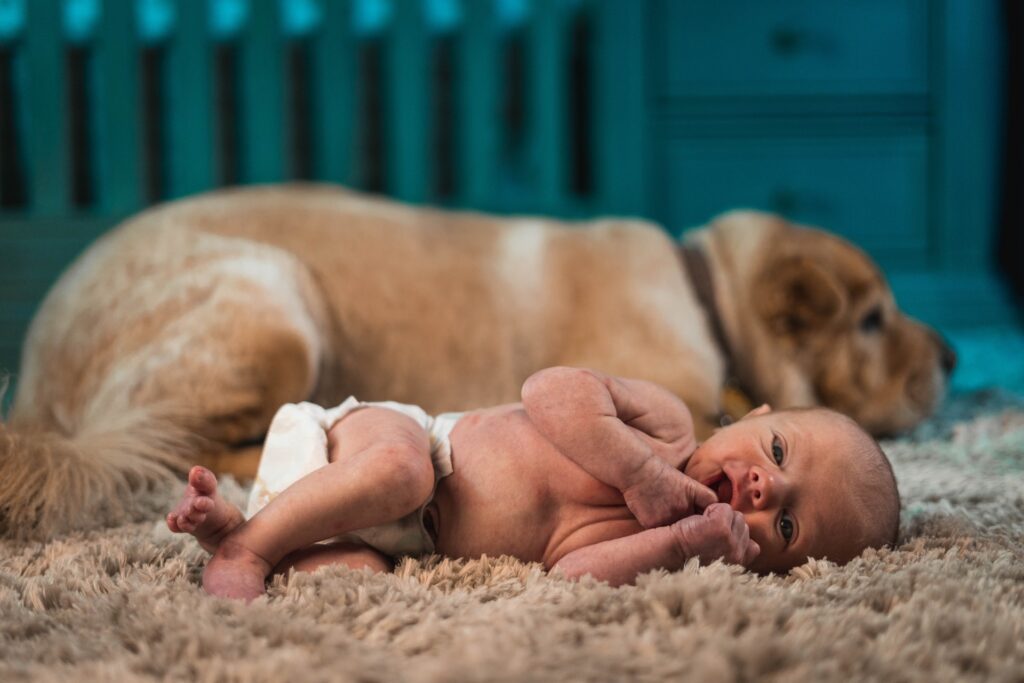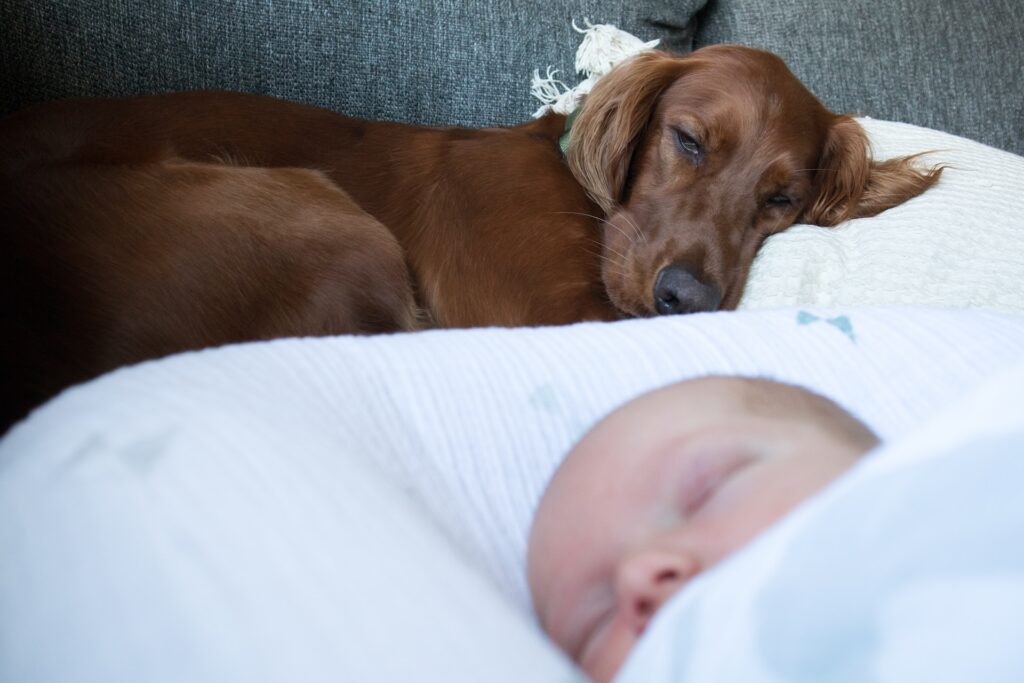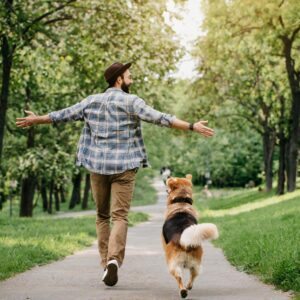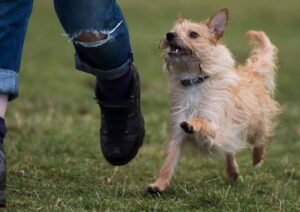Need help with Reactive Dog Behaviour? Join my FREE Facebook support group...
How to prepare your dog for a new baby; crucial things to consider!
Bringing home a new baby often means stressful changes to a dogs routine. Whilst we can never fully prepare them for what’s coming, we can minimise the stress. Here are my top ways you can prepare your dog for a new baby.
Build up resilience
Resilience is what helps our dogs bounce back from stressful experiences. We already know that we can’t take all the stress away. But if we build up their resilience, we know they will cope better with the stuff we can’t prepare them for.
Existing anxiety
Nothing wears down resilience quicker than anxiety. So, the first thing to do is start working on any existing behavioural issues, and especially those related to anxiety. This includes separation anxiety, reactive behaviour, and territorial type behaviours. If you need to, get help from an experienced behaviourist who will assess the problem and prescribe the right training plan for your dog. With a baby on the way, there is limited time to spend experimenting on potential solutions. If you use reward based methods, solving problems related to anxiety will also contribute to step two of building resilience; confidence…
Confidence
Confidence and trust are huge contributors to a dogs resilience. They are also both pretty easy to work on at a basic level. For confidence, learning new tricks and behaviours, using reward based techniques, will quickly build up your dogs overall confidence. Once he’s learned lots of fancy new skills, you can start using them in his daily routine. So, if you teach him a sit/stay, why not introduce it as part of his routine to get into the car. When you’ve got prams and car seats to worry about you might be glad you can rely on your dog to sit and wait patiently to get in the car.
Clicker training is great for boosting confidence. As well as being a great way to reward good choices, it also adds anticipation, which is good for confidence building. So for a double whammy, introduce it alongside whatever hobby or training you do.
If he knows lot’s of tricks already, or that type of training doesn’t appeal, why not take up a hobby together such as agility or man-trailing. Man-trailing is particularly good for dogs that could do with a bit more mental stimulation. All that sniffing and searching will tire their brain out pretty quickly. Agility will too, to some degree, but is also quite physical, so might suit a more athletic dog.
Trust
Trust comes from advocating for your dog well and being predictable. Being their advocate means not putting them in situations they wouldn’t choose to be in. So, for example, if your dog hates off lead dogs, to advocate for him would mean avoiding those types of places. It also means, not using aversive training methods. Any kind of training that uses threat, fear, or pain to get results will quickly erode trust and undo any resilience that has been built up.
You will also build up trust by being predictable. If your dog knows that an action will always lead to the same response, he will feel more in control. So, this might look like everyone only greeting your dog when he sits at the front door, doing loose lead training in the same way as everyone else, or always feeding at the same time. So start thinking about where inconsistencies might be and fix them as part of your preparation.
New sounds
Babies make a lot of noise, and often the sounds feel quite urgent and high pitched to a dog. These kinds of noises typically trigger excitement or anxiety, which is not what you want from your dog the first time your baby cries. So, it’s a good idea to start desensitising them to those kinds of sounds before your baby comes.
The best way to do his is to download a sound track of a baby crying to play to them well in advance. Start playing it really quietly, so they can barely hear it, and increase over time so it becomes boring. The sounds will normalise over a period of weeks or months and he will naturally start to drown them out as they won’t mean anything. By the time your baby comes along, the sounds will be boring to him and he won’t panic when he hears it for the first time.
So much stuff!
As well as a new baby, you will also be expecting an influx of new stuff. If you can, bring this all into the house gradually. Not only will it prevent overwhelm, but your dog will have time to properly investigate each item before the next one shows up.
Make sure to give him plenty of encouragement as he investigates each item. Investigating new things in a positive way will allow him to get used to the new items. But, it will also contribute to his overall confidence, and therefore his resilience. And, if you can get him to do it with his nose, it will also be quite tiring so it’ll also count towards his enrichment. Win-win-win!
You’ll need some new tricks
You can teach any trick to boost confidence, but here are a few that will come in particularly handy when the baby comes:
Doorbell routine
First, start working on a calming doorbell routine. You’ll have plenty of visitors when the baby arrives and you don’t want your dog bouncing all over everyone as they come and go. You might also get visitors when baby is asleep, so you’ll want your dog to learn to do it quietly too. There are plenty of ways you can do this. Check out my YouTube video for how I do it!
Place
A place command is really useful when you need some space. For example, when you want to feed or change baby and he’s trying to get into the middle of it. Telling your dog to go to “place” is much more positive than telling them to get off or out! It will also come in handy when your dog is a little unsure and you need to direct him. I teach dogs to go to a small mat. This way, you can take the mat with you when you go places with your dog. This is ideal when you are visiting family, or going to a cafe or restaurant.
Mat is lava
At some point, your baby will probably get an activity mat for the floor. So, now is a good time to play “mat is lava” with your dog. If you can, get a mat from a charity shop and start teaching your dog not to go on it now. By the time the baby comes, he’ll be well practised at avoiding your babies floor mats. While you are in the charity shop, why not get a selection of other baby toys to go on the mat and he can learn to ignore those too.

Stair gates and crates
If your dog has not needed them before, now is a good time to introduce stair gates and crates. He might not be used to being restricted in these ways, but you will almost certainly need a stair gate at some point. You might also want to use a crate. To introduce a crate well takes time, so not something you want to leave until you need it. Instead, set it up now and make it super cosy for your dog. Place toys and treats into it from time to time and let him get used to it over time. Add a stair gate across your stairs or a restricted room too, so he can get used to that now too.
Walking with wheels
As soon as you get your pram you’ll want to introduce him to “walking beside wheels”. This can be quite an adjustment for a dog as they are more used to walking amongst our feet. Just take it slowly and do one step at a time. As his confidence grows, you can gradually speed up. If he doesn’t walk on a loose lead, that is something to fix now also. As every week goes by, the need for your dog to walk loosely increases. It’s not fun walking a dog that pulls when you are pregnant, so start working on that asap too!
A new routine
Your routine will be changing a lot. And not just when the baby arrives, it’ll also change as your pregnancy progresses. So let’s start as you mean to go on and start thinking about what your future routine might look like. You’ll certainly not be sitting about with your dog on your knee for long periods, or be playing with toys on demand. Your baby will be taking up a lot of your time, whether you are walking them about the house to get them to sleep, feeding them on your knee, or changing them on the sofa. Your dog will need to change his expectations of what he will get from you, and when. He might also be banned from some rooms, or certain places.
However you imagine your new routine might look, start making adjustments as soon as you can so it doesn’t end up overwhelming your dog. If you can do this in advance, he’ll also not associate the changes with the new baby either!

New smells
Smells are the hardest to work on in advance. Once upon a time, mum would have spent a bit of time in hospital with the new baby. During this time, clothes and blankets could be sent home for the dog to sniff. By the time the baby arrived home, he would just be putting a face to a smell. They don’t do it that way anymore, and you will be lucky to spend a day in hospital now!
But, if you are lucky, you might know someone with a baby, and maybe they would let you borrow some unwashed baby clothes. This will at least prepare your dog for general baby smells, which is better than nothing.
If you have done everything else though, the baby herself will be the only new thing left to introduce to your dog. Much better than having to deal with new sounds, stuff, people, and a new baby. This way, they should ignore everything else, and just want a sniff of baby. Your dog will want to sniff the bum and head first, so when the time comes, turn your baby to face you allowing the dog access to the important bits.
Whatever you do…
Whatever you do, if you can build up resilience by solving existing problems and working positively together, your dog should have the skills needed to deal with whatever changes are coming!
Good luck!
Are you struggling with your dogs behaviour?
Private Dog Behaviour Consultations are currently available in the Dundee area and beyond. If you are looking for help solving your dogs behaviour and training problems, then please get in touch!


